|
|
|
Sort Order |
|
|
|
Items / Page
|
|
|
|
|
|
|
| Srl | Item |
| 1 |
ID:
117525
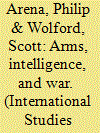

|
|
|
|
|
| Publication |
2012.
|
| Summary/Abstract |
How do states respond to uncertainty over their opponents' military strength? We analyze a model of crisis bargaining in which, prior to negotiation, an uninformed state chooses how to allocate scarce resources across armaments and intelligence gathering. Arming improves military capabilities, while intelligence gathering improves estimates of the other state's military capabilities. Our model thus allows both the distribution of power and the level of uncertainty in the crisis to be determined endogenously. We derive some notable results. First, the relationship between information revelation and war is conditional on beliefs held before the information is received, as more accurate information can reduce the probability of war for optimistic states but increase it for pessimistic ones. Second, the allocations that minimize the probability of war are often not those made in equilibrium. Finally, considering the interdependence between the two allocations yields unique insights into the relationship between the distribution of capabilities, uncertainty, and the risk of war.
|
|
|
|
|
|
|
|
|
|
|
|
|
|
|
|
| 2 |
ID:
117521
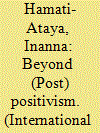

|
|
|
|
|
| Publication |
2012.
|
| Summary/Abstract |
This paper explores Pragmatism's potential for transcending the antagonism between positivism and post-positivism, through the work of Morton Kaplan, who combines a Pragmatist theory of knowledge with a systems theory of world politics. A reconstruction of Kaplan's synoptic philosophy shows how Pragmatism can help us move beyond the dual fallacy of truth as correspondence and truth as self-consciousness, to a non-foundationalist epistemology that acknowledges the historicity of knowing without annihilating the realism of the common world we live in. Moving from the realm of knowledge to the realm of judgment, this paper also reconstructs Kaplan's moral analysis, thereby revealing its significance for the discipline's renewed concern for the problems of values and reflexivity.
|
|
|
|
|
|
|
|
|
|
|
|
|
|
|
|
| 3 |
ID:
117531
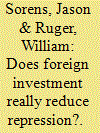

|
|
|
|
|
| Publication |
2012.
|
| Summary/Abstract |
Cross-national empirical studies have found that foreign investment has beneficial effects on human rights. We argue that these studies poorly operationalize foreign investment to test theoretical predictions and suffer from sampling bias. We demonstrate that investment stock, rather than inflow, is the superior operationalization of structural dependence theory. We construct regression models of government repression of physical integrity rights, include much more data than previous studies, and use a new multiple imputation algorithm for time-series cross-section data to resolve sampling bias. We find no evidence that foreign investment affects repression, contradicting conventional wisdom and suggesting that the political gains from repression frequently dwarf any economic costs for governments.
|
|
|
|
|
|
|
|
|
|
|
|
|
|
|
|
| 4 |
ID:
117527


|
|
|
|
|
| Publication |
2012.
|
| Summary/Abstract |
While delegation to international organizations has received substantial attention in the international relations literature, the issues of institutional choice and delegation levels remain understudied. Existing research examines donor countries' decision to distribute aid bilaterally or turn to a multilateral organization; this article shifts the focus toward a closely related, but often overlooked, decision that donors need to make-that is, they select an agent from a range of international organizations and determine the level of delegation to a given agent. I argue that in their delegation decisions, donors are guided not only by standard calculations of delegation costs and benefits, but also by policies that international development agencies adopt and implement. These policies are shaped by member governments' preferences, and a donor country will delegate more to the organizations whose members have foreign policy preferences more in line with the donor country's own preferences, ceteris paribus. The article presents a set of empirical tests that lend support to this argument. Cross-country data on European development aid given during the period 1960-2000 are used in the analyses.
|
|
|
|
|
|
|
|
|
|
|
|
|
|
|
|
| 5 |
ID:
117518


|
|
|
|
|
| Publication |
2012.
|
| Summary/Abstract |
International Relations scholars have long debated whether the American public is allergic to realism, which raises the question of how they would "contract" it in the first place. We argue that realism isn't just an IR paradigm, but a belief system, whose relationship with other ideological systems in public opinion has rarely been fully examined. Operationalizing this disposition in ordinary citizens as "folk realism," we investigate its relationship with a variety of personality traits, foreign policy orientations, and political knowledge. We then present the results of a laboratory experiment probing psychological microfoundations for realist theory, manipulating the amount of information subjects have about a foreign policy conflict to determine whether uncertainty leads individuals to adopt more realist views, and whether realists and idealists respond to uncertainty and fear differently. We find that many of realism's causal mechanisms are conditional on whether subjects already hold realist views, and suggest that emotions like fear may play a larger role in realist theory than many realists have assumed.
|
|
|
|
|
|
|
|
|
|
|
|
|
|
|
|
| 6 |
ID:
117526
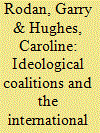

|
|
|
|
|
| Publication |
2012.
|
| Summary/Abstract |
International aid agencies are increasingly placing social accountability at the heart of their governance reform programs, involving a range of social activist mechanisms through which officials are rendered answerable to the public. Crucially, aid agencies are not just promoting these mechanisms in emerging democracies, but now also in authoritarian societies. What then are the likely political regime effects of these mechanisms? We approach this by examining who supports social accountability, why, and the implications for political authority. Focusing on the Philippines and Cambodia cases, it is argued that, to differing degrees, social accountability mechanisms have been subordinated to liberal and/or moral ideologies favoring existing power hierarchies. These ideologies often privilege nonconfrontational state-society partnerships, drawing activists into technical and administrative processes limiting reform possibilities by marginalizing, or substituting for, independent political action pivotal to the democratic political authority of citizens.
|
|
|
|
|
|
|
|
|
|
|
|
|
|
|
|
| 7 |
ID:
117522
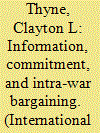

|
|
|
|
|
| Publication |
2012.
|
| Summary/Abstract |
This article considers how governmental variations affect the duration of civil conflicts. Recent work suggests that war termination is likely when competing actors gain information about the power balance and are able to credibly commit to war-ending agreements. I focus on how the strength and stability of executives impact these factors. Regarding information, power consolidation within the government reduces the number of people who must agree on a settlement, which should shorten civil conflicts. Stable leadership should likewise shorten conflicts by making it harder for potential spoilers to derail war-ending agreements, helping minimize credibility problems. This argument is tested by examining how variations in institutional design (executive constitutional and legislative power), political strength (ideological fragmentation and polarization), and stability (leadership tenure) affect the duration of civil conflicts from 1946 to 2004. The results suggest that powerful and stable executives are indeed well equipped to end civil conflicts.
|
|
|
|
|
|
|
|
|
|
|
|
|
|
|
|
| 8 |
ID:
117517
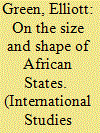

|
|
|
|
|
| Publication |
2012.
|
| Summary/Abstract |
African states are both unusually large and well known for having artificial borders created during the colonial period. While African state size and shape have been previously shown to be correlated with negative development outcomes, no one has heretofore examined the origins of either phenomenon. Here, I show that African state size and shape are not arbitrary but are rather a consequence of Africa's low pre-colonial population density, whereby low-density areas were consolidated into unusually large colonial states with artificial borders. I also show that state size has a strong negative relationship with pre-colonial trade and that trade and population density alone explain the majority of the variation in African state size. Finally, I do not find a relationship between population density and state size or shape among non-African former colonies, thereby emphasizing the distinctiveness of modern African state formation.
|
|
|
|
|
|
|
|
|
|
|
|
|
|
|
|
| 9 |
ID:
117528
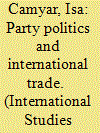

|
|
|
|
|
| Publication |
2012.
|
| Summary/Abstract |
How does party politics influence trade outcomes? Previous studies offer a limited understanding of the role of political parties in trade policymaking due to their restrictive assumptions that downplay the distinct organizational identity of political parties and the competitive logic of their interactions. This paper develops a theoretical argument that emphasizes the competitive forces of party politics as a key determinant of party preference for trade and hence of trade outcomes. This theoretical argument is illustrated and tested in analysis of the trade implications of strategic interactions between mainstream parties and niche parties. The empirical analyses confirm that party strategic factors need to be assigned a substantial analytical weight in explaining trade outcomes.
|
|
|
|
|
|
|
|
|
|
|
|
|
|
|
|
| 10 |
ID:
117520


|
|
|
|
|
| Publication |
2012.
|
| Summary/Abstract |
On the eve of World War II, eight countries had completely abolished the death penalty and another six had banned it for ordinary crimes. As of early 2008, 92 countries had prohibited capital punishment for all crimes and 10 more had ruled it out for ordinary crimes. The goal of this article is to account for the pattern of national abolition of the death penalty since 1960. We hypothesize that certain kinds of democracies are more liable to end capital punishment than others. Specifically, the negotiated form of democracy produced by parliamentary systems with proportional representation ("consensus democracy" in Lijphart's terms) is more likely to do away with the death penalty than are other forms of democracy. As previous research indicates, democratic transitions also increase the likelihood of abolition. Finally, international influences can also tip countries toward abolition. We suggest that incentives provided by international organizations, particularly in Europe, have drawn some countries toward abolition. The empirical analysis of approximately 150 countries for the period 1960-2005 confirms our expectations.
|
|
|
|
|
|
|
|
|
|
|
|
|
|
|
|
| 11 |
ID:
117519


|
|
|
|
|
| Publication |
2012.
|
| Summary/Abstract |
In this paper, we examine how the past alliance behavior of nations affects the likelihood that these states will be involved in alliance formation. We contend that nations evaluate the reputations of potential allies when searching for alliance partners. Reputation information is processed by governments along with other immediate concerns. By introducing a model and developing subsequent measures of reputational alliance histories, we improve upon our current understanding of the factors that drive alliance formation. Using alliance reputation data derived from the ATOP project (1816-2000), we find support for the hypothesis that a reputation for upholding one's agreements significantly improves the likelihood of membership in future alliances.
|
|
|
|
|
|
|
|
|
|
|
|
|
|
|
|
| 12 |
ID:
117524


|
|
|
|
|
| Publication |
2012.
|
| Summary/Abstract |
Do remittances increase corruption in recipient states? Previous research suggests that remittances allow governments to maintain policies that create corrupt state-society relations. In contrast, this paper argues that remittances mitigate corruption by increasing government accountability and providing other incentives to reform. Using data from Mexico in 2001-2007, this study shows that corruption trended downward in states receiving larger remittance sums, after controlling for political competition, divided government, and market openness. The results are robust to instrumental variable analysis testing for potential endogeneity between corruption and migration. These findings bring attention to remittances as an exogenous resource for reform-minded groups and suggest that they may operate as the converse of the resource curse.
|
|
|
|
|
|
|
|
|
|
|
|
|
|
|
|
| 13 |
ID:
117523


|
|
|
|
|
| Publication |
2012.
|
| Summary/Abstract |
The 2008-2009 global economic crisis has revived debates concerning the decline of American hegemony and the rise of China. This article engages with these debates on two levels. First, through situating the 2008-2009 crisis in longer-term development trends in the world economy, I suggest that the empirical evidence of American decline is more ambiguous and that the crisis itself is not, necessarily, an indicator of decline, but rather an organic feature of uneven development with more open political consequences. Secondly, I offer a revised neo-Gramscian perspective on American hegemony by highlighting the contradictions between the structural logic of uneven development and the neoliberal historical bloc. Through this I provide an alternative overview of the evolution of American hegemony over the last 30 years pointing to the likely continuation of American/neoliberal global hegemony.
|
|
|
|
|
|
|
|
|
|
|
|
|
|
|
|
| 14 |
ID:
117529
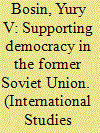

|
|
|
|
|
| Publication |
2012.
|
| Summary/Abstract |
Recent studies find that US democracy assistance has helped build new democratic regimes across the globe. Nearly two decades of democracy assistance in the former Soviet Union (FSU), however, appear to have had a negligible impact on democracy in the region. This research uses a time-series cross-sectional statistical analysis to establish that US democracy assistance efforts in the FSU have failed to enhance democracy in the region. The incentives that FSU leaders had to misrepresent their commitment to democracy and the United States' understandable misperception of these leaders' actions help to explain this failure.
|
|
|
|
|
|
|
|
|
|
|
|
|
|
|
|
| 15 |
ID:
117530


|
|
|
|
|
| Publication |
2012.
|
| Summary/Abstract |
As countries increasingly protect their domestic industries by government subsidies, specific subsidies-subsidies that target specific industries or firms-have received increasing international attention due to their negative externality in international trade. In this paper, I argue that variations in domestic institutional arrangements can explain the cross-national variation in subsidy specificity. First, I theorize that the size of specific subsidies has an inverted U-shaped relationship with the level of centralization of economic interests, while the size of general subsidies monotonically increases with the level of centralization of economic interests. Then, I expect the supply-side factors such as electoral institutions and government partisanship to interact with the effects of centralization in determining the amount of specific or general subsidies in a country. Using the state aid data set of the European Union between 1992 and 2004, I find that the amount of sectoral aid-state aid targeted at specific industries or firms-is larger in countries where labor and business interests are organized at the industry level than in countries with decentralized or highly centralized industrial relations. The size of state aid targeting a wide range of economic sectors increases as the centralization of labor and business interests increases.
|
|
|
|
|
|
|
|
|
|
|
|
|
|
|
|
|
|
|
|
|